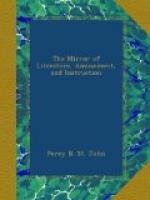M.L.B.
* * * * *
OLD POETS
* * * * *
DRUMMOND OF HAWTHORNDEN.
["A Lover of Old English Poetry,” has, in the last London Magazine, a short paper on DRUMMOND of HAWTHORNDEN, a name dear to every poetical mind, and every lover of early song. His intention, he says, is “rather to excite than satiate” the taste of his readers for the poetry of Drummond,—an object in which we cordially agree, and would contribute our offering, had not the task, in the present instance, been already so ably performed. We cannot, therefore, do better than introduce to our readers a few of his judicious selections. They are exquisite specimens of the evergreen freshness of old poetry, and by their contrast with contemporary effusions will contribute to the mosaic of our sheet. By the way, we hear of a sprinkling of the antique world of letters in some of the “Annuals”—an introduction which reflects high credit on the taste of the editors, and serves to prove that sicklied sentimentalities, like all other sweets, when enjoyed to excess, will cloy the fancy, but not so as entirely to unfit the mind for a higher species of intellectual enjoyment. We would have old and new alternate in the literary wreath, lest, by losing the comparison, the “bright lights” of other times should be treated with irreverence and neglect.]
FROM THE “HYMN ON THE FAIREST FAIR.”
I feel my bosom glow with wonted fires: Raised from the vulgar press, my mind aspires, Wing’d with high thoughts, unto His praise to climb From deep Eternity who call’d forth time:— That ESSENCE, which, not mov’d, makes each thing move,— Uncreate beauty—all-creating love... Ineffable, all-powerful GOD, all free,— Thou only liv’st, and all things live by thee... Perfection’s sum—prime cause of every cause, Midst and beginning, where all good doth pause... Incomprehensible, by reachless height; And unperceived, by excessive light. O King! whose greatness none can comprehend, Whose boundless goodness does to all extend,— Light of all beauty, ocean without ground, That standing, flowest—giving, dost abound... Great Architect—Lord of this universe,— That sight is blinded would thy greatness pierce.
Then follows this noble simile, nobly sustained, and with a flow and harmony of verse not common in the poets of his period:—
Ah! as a pilgrim who the Alps doth pass,
Or Atlas’ temples crown’d
with winter glass,—
The airy Caucasus, the Apennine,
Pyrenees’ cliffs, where sun doth
never shine;—
When he some craggy hills hath overwent,
Begins to think on rest, his journey spent,
Till mounting some tall mountain he do
find
More heights before him than he left behind,—
With halting pace so while I would me
raise
To the unbounded limits of Thy praise,
Some part of way I thought to have o’errun;
But now I see how scarce I have begun—
With wonders new my spirits range possest,
And, wandering wayless, in a maze them
rest.




